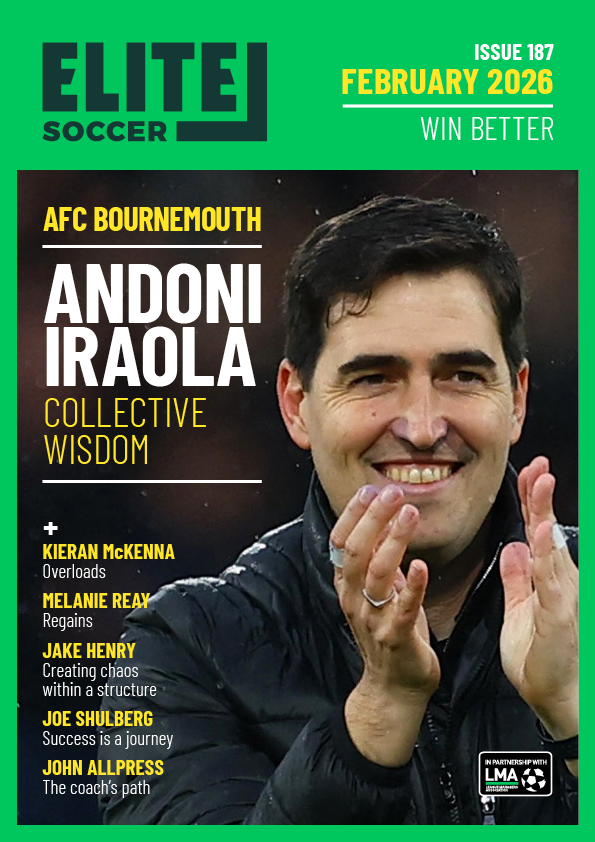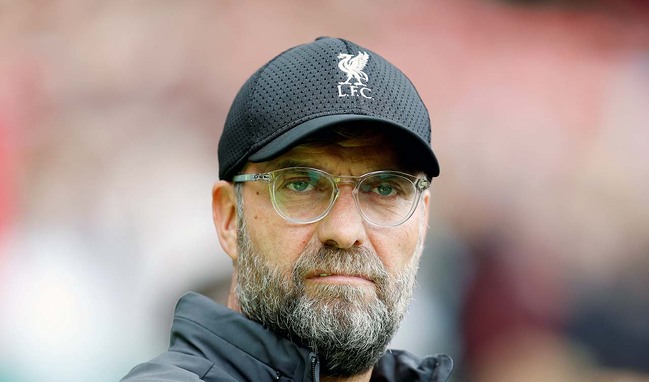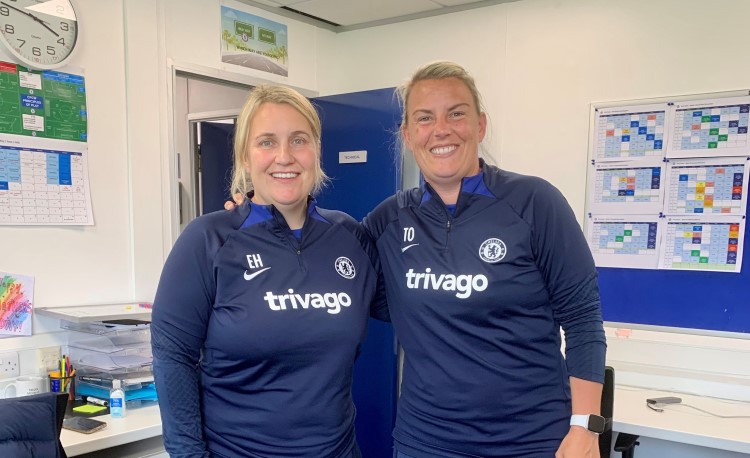NEXT ELITE SOCCER COACHING AWARD COHORT STARTS FEBRUARY 16 - ENROL NOW
You are viewing 1 of your 1 free articles
Returning home
Having managed at domestic and international level, Stuart Pearce is back at Nottingham Forest where, under Brian Clough, he first experienced the power of passion and strength of character.
Stuart Pearce didn’t take a traditional route into professional football and it is not all he has ever known. In fact, as avid biography readers may know, before Stuart Pearce the professional footballer and manager came Pearce the electrician.
And even before that opportunity arose, the young Pearce spent a year lugging crates around a cold warehouse. This is not just trivia. It goes some way to explaining how a man who has experienced all the fame and trappings of a successful international footballing career and the power and responsibility of management has remained entirely grounded.
“There’s no doubt that those years in a working environment helped me appreciate just how precious it was to be able to play professional football,” says Pearce. “It also influenced how I treat people; how I empathise with them and the situations they are in. I don’t think my personality has changed throughout my career as a player, coach and manager; I have always remained very constant. Perhaps that’s why I’ve always been able to return to the clubs I’ve worked at and be well received by the fans and staff there.”
Pearce was in his early 30s and still playing professionally when he first started to consider a career in management. “Thoughts of retirement were far from my mind, but I knew that when I did stop playing I’d want to stay in the game because I enjoyed making decisions and shouldering responsibility,” he says. While Pearce didn’t hang up his boots and move into management until he was 40, he had been working towards his coaching qualifications while playing for West Ham United and Newcastle United . “It never crossed my mind that I was owed anything or deserved special treatment just because I had been a player. I was determined to prepare as fully as possible for management and really threw myself into it; taking every available course on coaching, leadership and psychology,” he says. “When I was working at the FA and Fabio Capello was appointed England manager I even started to learn Italian as another avenue of self-improvement.” Pearce also lapped up the experience presented by two spells as interim manager, first at Nottingham Forest and later at Manchester City.
“I was still playing for Forest when the call came to say that Frank Clark had left and the club wanted me to be caretaker manager for a month,” recalls Pearce. “I agreed to do it, but wondered how it would work with me as captain and manager of the team; should I move out of the dressing room, for example?” He decided to stay put with his fellow teammates. “After all, I was a senior player who had always acted professionally and many of the players treated me with a lot of respect,” he says. Pearce was surprised, however, by how quickly he stopped being just one of the boys.
“They say that when you become a manager you change a bit, but I didn’t,” he says. “What did change drastically, however, was the attitude of the team towards me; how they spoke in front of me and reacted to me. These were people who had been my friends in and out of work.”
But while his six months as player/manager was an interesting ‘no pressure’ introduction into management, it was his time at Manchester City under Kevin Keegan and Arthur Cox that presented the steepest and most valuable learning curve. “When I told Kevin I wanted to go into management he was incredibly supportive. He said I could stay with City and gain some experience on the coaching staff while applying for jobs,” says Pearce. “As well as assisting in coaching the first team, I got to see what was going on in the academy, attend board meetings and observe and learn.” When Keegan left the club in 2005, Pearce was appointed caretaker manager and later accepted the permanent role. While with the club, he also began to work part-time as manager of the England Under-21s and when his spell with City came to an end two years later, he turned his attention fully to this FA role. While the environment and targets were different, Pearce says his approach did not waver. “I believe your values and character should remain constant, irrespective of the organisation that you’re working for,” he says. “The way I have approached managing clubs and the England Under-21s has been the same. For each team, I have set targets at the start of the season and I’ve given plenty of feedback to all concerned, whether things are going well or are not quite on track.” After his tenure with the Under-21s ended, and having already immersed himself in learning and travel during his previous working years, Pearce took the opportunity to have a proper break and recharge his batteries.
Then, in July 2014, his career came full circle when he took the manager’s job at Nottingham Forest, the club where he had spent eight years as a player. Taking with him a team of people he knew and trusted helped him hit the ground running. “I know my own limitations and so always try to appoint professional and experienced people who complement my own skills and who I know I can trust explicitly. I don’t try to dominate them; instead I trust in their knowledge and empower them to get on with their work. I think the fact I’m not a domineering or power-hungry person serves me quite well as a football manager, because you can’t be hands on with everything all of the time in modern management; there are so many issues to deal with that you have to be able to delegate.”
Pearce works closely with eight key staff at Forest, all of whom are passionate about the club and know it inside out. “There are also 10 or so people working at Forest who were there when I played for the club 17 years ago,” he adds. “That and the fact the fans know I care about them and the club have made it easy to settle into the role.”
During his year out of management Pearce gave a lot of thought to where he would like to work next. “I didn’t want just any job,” he says. “I wanted something that would really inspire me; something that might give me the same buzz I used to get walking up Wembley Way with the England crest on my jacket. It gives me such a sense of pride to be managing Forest. If you can feel that way about your employer then you are already at an advantage.” The inspiration that Forest gives Pearce is largely down to everything that playing for the side represented; the ethos that Brian Clough brought to the club and how much Pearce valued his time playing under him. “Anyone who was lucky enough to work for or with Brian Clough for any length of time knows the strength of his personality,” says Pearce. “I’ve met royalty, politicians and many people of note in my life, but Clough was off the chart in terms of character.” Just being in his presence and watching him work was, says Pearce, an education. “He had a strong football philosophy and that never buckled, no matter how the results were going or what public opinion was. His mentality was strong and the trophy cabinet certainly supported his approach.”
Having spent eight years under Clough’s wing, it is unsurprising that Pearce considers him his greatest influence, and he works hard to maintain a similarly strong ethos. “I went to Afghanistan three years ago as an FA ambassador and I was asked if I would address a group of soldiers who were training to be leaders. I’d never spoken directly with anyone about leadership before or articulated my thoughts on the subject and it really made me think about what a leader needs to do and be. “I realised that a leader’s words and actions have to tally; you have to walk the talk. It is also essential that your people know you care about them, that you are prepared to make tough decisions and are honest,” says Pearce. “When I was appointed Forest manager I had to take some players into my office and tell them that they didn’t have a future at the club. But I did what I could to reassure them that while they found new clubs I would continue to coach them and would do whatever I could to help them. It is important that everyone knows where, if at all, they fit into your plans and I know they appreciated that.”
But Pearce believes it is equally important to have an open and honest relationship with the supporters and on a number of occasions this season he could be seen at the away end chatting with the Forest fans. “I don’t do it for good publicity,” he says. “I do it because those fans have travelled a long way to watch us play and I care about them and value their opinion. If you want to find out who the best player in a team is go and ask the supporters.”
Pearce has never sat in an ivory tower; he has stayed grounded, knowing he is no different at heart from all the other passionate football fans in the stands. He has dedicated himself to lifelong learning and improvement, and is open minded enough to realise that no one person has all the answers. He is, just as he started out, one bright spark.
Editor's Picks
Attacking transitions
Deep runs in the final third
Using the goalkeeper in build-up play
Intensive boxes drill with goals
Penetrating the final third
Creating and finishing
My philosophy
Pressing initiation
Compact team movement
Coaches' Testimonials

Alan Pardew

Arsène Wenger

Brendan Rodgers

Carlos Carvalhal

José Mourinho

Jürgen Klopp

Pep Guardiola

Roy Hodgson

Sir Alex Ferguson

Steven Gerrard
Coaches' Testimonials

Gerald Kearney, Downtown Las Vegas Soccer Club

Paul Butler, Florida, USA

Rick Shields, Springboro, USA

Tony Green, Pierrefonds Titans, Quebec, Canada
Join the world's leading coaches and managers and discover for yourself one of the best kept secrets in coaching. No other training tool on the planet is written or read by the calibre of names you’ll find in Elite Soccer.
In a recent survey 92% of subscribers said Elite Soccer makes them more confident, 89% said it makes them a more effective coach and 91% said it makes them more inspired.
Get Monthly Inspiration
All the latest techniques and approaches
Since 2010 Elite Soccer has given subscribers exclusive insight into the training ground practices of the world’s best coaches. Published in partnership with the League Managers Association we have unparalleled access to the leading lights in the English leagues, as well as a host of international managers.
Elite Soccer exclusively features sessions written by the coaches themselves. There are no observed sessions and no sessions “in the style of”, just first-hand advice delivered direct to you from the coach.






